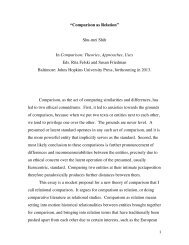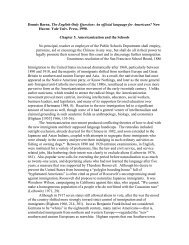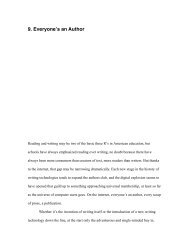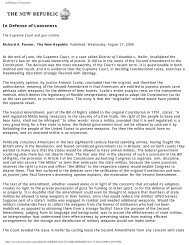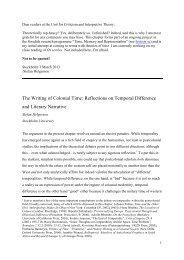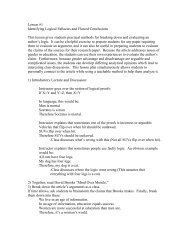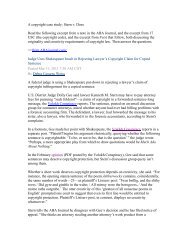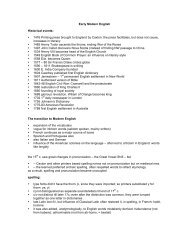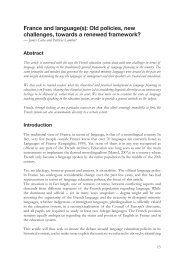Transnationalism: A Category of Analysis - Unit for Criticism and ...
Transnationalism: A Category of Analysis - Unit for Criticism and ...
Transnationalism: A Category of Analysis - Unit for Criticism and ...
You also want an ePaper? Increase the reach of your titles
YUMPU automatically turns print PDFs into web optimized ePapers that Google loves.
<strong>Transnationalism</strong>: A <strong>Category</strong> <strong>of</strong> <strong>Analysis</strong> | 629<br />
agenda that resonated with decolonization movements from Latin America<br />
<strong>and</strong> the Caribbean to Africa to Asia, particularly Vietnam <strong>and</strong> Algeria. One<br />
<strong>of</strong> their innovations was to decenter previously territorialized <strong>and</strong> localized<br />
subjects—antifascism, Marxism, literature, the exploration <strong>of</strong> psychic distress,<br />
<strong>and</strong> modern economies. Not only did they call attention to the vibrant existence<br />
<strong>of</strong> such phenomena in the Third World (not just Europe <strong>and</strong> the <strong>Unit</strong>ed<br />
States), but they also implicitly <strong>and</strong> explicitly reconceptualized them as rooted<br />
in transnational processes—colonialism <strong>and</strong> the resistance to it. Intellectuals<br />
such as C. L. R. James, Frantz Fanon, <strong>and</strong> Alejo Carpentier wrote powerful<br />
texts that centered transnational processes <strong>and</strong> retooled familiar narratives:<br />
antifascism, but from the perspective <strong>of</strong> Ethiopia; Marxism, but from the<br />
point <strong>of</strong> view <strong>of</strong> black nationalism; psychiatry, but mapping the effects <strong>of</strong><br />
racism, imperialism, <strong>and</strong> anti-imperialist activism; the radical avant-garde<br />
<strong>and</strong> the liberatory potential <strong>of</strong> the imaginary <strong>and</strong> the marvelous, but from the<br />
perspective <strong>of</strong> Haiti. 6 Historians <strong>of</strong> Latin America began examining the effects<br />
<strong>of</strong> imperialism <strong>and</strong> <strong>for</strong>ms <strong>of</strong> migration through such themes as the evolution<br />
<strong>of</strong> economic relations <strong>and</strong> power struggles within colonial institutions, most<br />
prominently the slave trade, mining, <strong>and</strong> other <strong>for</strong>ms <strong>of</strong> mercantile investment.<br />
Immanuel Wallerstein, looking to bring closure to the debate over feudalism<br />
<strong>and</strong> capitalism in explaining the supposed “lag” in economic development<br />
the “Third World,” proposed his world systems model in the mid-1970s. 7<br />
In it, he extended the center/periphery proposition <strong>of</strong> Ernesto Laclau, Raúl<br />
Prebisch, <strong>and</strong> André Gunder Frank, <strong>and</strong> <strong>for</strong>ced into the “development” debates<br />
the possibility that impoverished economies were not isolated isl<strong>and</strong>s awaiting<br />
the coming <strong>of</strong> modernity, but part <strong>of</strong> a continuous, interconnected, historical<br />
process that enriched some at the expense <strong>of</strong> others. 8<br />
One presupposition <strong>of</strong> these antifascist <strong>and</strong> cold war texts was that if imperialism<br />
<strong>and</strong> capitalism were the problem, then some <strong>for</strong>m <strong>of</strong> socialism might<br />
well be the answer. After 1989, though, we saw the emergence <strong>of</strong> a radical<br />
<strong>for</strong>mation that was openly critical <strong>of</strong> postcolonial socialist regimes, although<br />
still Marxist, via Gramsci: subaltern studies, a powerful South Asian critique,<br />
rooted in peasant studies. 9 Subaltern studies disrupted the fundamental<br />
underpinning <strong>of</strong> the decolonial nation-building process by insisting that<br />
postcolonial nations were still fundamentally shaped by historical colonial<br />
processes, epistemologically, institutionally, <strong>and</strong> in their processes <strong>of</strong> citizen<br />
subject-<strong>for</strong>mation. In Provincializing Europe, Dipesh Chakrabarty intervened<br />
in India’s national-history writing project, arguing compellingly that history<br />
writing itself is a European enterprise, founded in epistemologies <strong>and</strong>



